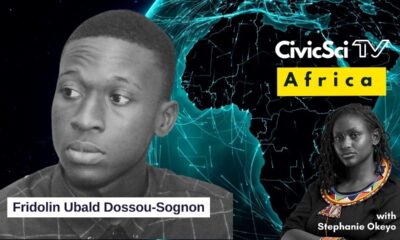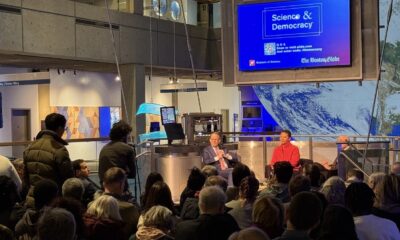Stories in Science Special Series
Building Self-Confidence Through Science
Lauren Tereshko: “I realized I had stopped putting positive energy into myself, and grew angry and restless. Ashamed of my stagnation, in a moment of catharsis, I made the decision to apply for grad school.”

Lauren Tereshko
[su_boxbox title=”About”]Lauren is a Neuroscience PhD candidate at Brandeis University working on a collaborative project between the Sengupta and Turrigiano Labs. She is interested in molecular neuroscience and studies how signaling through neuronal primary cilia may affect synapses. She is an advocate for equity in STEM and is currently co-chair of Brandeis’ Women in Science Initiative.[/su_boxbox]
[su_boxnote note_color=”#c8c8c8″]Key points:
- Don’t give up on yourself.
- Find support in your community and find ways to give back to it.
- The academic system has problems, but you can be a part of positive change.[/su_boxnote]
[dropcap]I[/dropcap] started to feel separate from my peers when I got to college. Up till then, I had been confidently and comfortably nerdy. Science was the only subject I cared about in school, and was something I actively sought out in my free time. I read text books for the sheer joy of learning, a behavior that prompted my siblings to call me a “super nerd.” I felt really lucky to be starting college; I got into a school that offered Neuroscience as a major, and I even secured some financial aid and grants to help with tuition costs.

Lauren Tereshko
Despite my excitement, by the first week of college I felt like a fish out of water in many ways. Growing up a tomboy, I found it unnerving to be living in an all-girls dorm. Many of the girls came from wealthy families and didn’t have to work to cover tuition costs. I went to a large institution where classes felt less about learning than they did about surviving the workload. To make things worse, I had a number of negative interactions with my older, white, male faculty advisor which left me jaded and dejected. I felt split between being grateful for the opportunity to attend college, and being disappointed by a system devoid of relatable role models. The more I learned about the inner workings of academia, the more disenchanted I became.
As I work toward finishing my doctoral thesis, I can proudly say that I’ve reclaimed the title of Super Nerd.
After graduating – left with a paradoxical interest in neuroscience and distaste for academia – I lost my sense of purpose. No longer sure I wanted to go to grad school, I took a job at the same university I received my degree from, and sunk into a comfort zone in the familiarity of the institution. As time passed, I found myself drifting. My job wasn’t challenging me and I wasn’t earning enough money. I became involved in a romantic relationship that became abusive, and alienated myself from my family and friends, hiding how bad things were getting in my personal life.
I realized I had stopped putting positive energy into myself, and grew angry and restless. Ashamed of my stagnation, in a moment of catharsis, I made the decision to apply for grad school. I moved out of my home, extracted myself from the unhealthy relationship, and started planning for my future. Even though I wasn’t sure if grad school would be right for me; it felt good to be taking action. I was still interested in neuroscience and felt willing to brave the academic system once again.
Today, as I work toward finishing my doctoral thesis, I can proudly say that I’ve reclaimed the title of Super Nerd.
In stark contrast to my undergraduate experience that was riddled with negativity, my graduate experience has rebuilt my confidence and self-worth. I feel valued as an individual, and have formed strong relationships with my peers and advisors. I’ve found empowerment through connecting with other women in science — a far cry from a tomboy feeling out of place in an all-girls dorm! I am fortunate to be at an institution with strong female representation, and can boast that my thesis committee is composed of entirely women.
My thesis is now centered around exploring the potential importance of primary cilia signaling in postnatal neurons.
A turning point was when my advisor proposed starting a new project. Entering Brandeis as Masters student, I joined Piali Sengupta’s lab and initially researched how the elaborate ciliated endings of sensory neurons in C. elegans attain their morphologies. I immediately fell in love with the work, and was able to gain molecular biology skills through the project. I knew that I wanted to stay in research so I reapplied to the PhD program, and was luckily accepted.
Shortly after, Piali asked if I would be interested in starting a collaboration with the Turrigiano Lab. The idea stemmed from the realization that most neuroscientists aren’t aware that neurons in the central nervous system are ciliated cells! I jumped at the chance to bridge my interests in neuroscience and cilia biology. My thesis is now centered around exploring the potential importance of primary cilia signaling in postnatal neurons.
Starting the collaborative project really helped me take ownership of my research. Such little is known about the function of primary cilia in the developed brain that I was starting from scratch. It’s been so exciting to explore such a novel area of research, the possibilities feel endless, and there is a lot of room for creativity. I’ve run many experiments to find negative results, but I am not disheartened. I’m still fascinated by the science and continue inching my way towards answers.
With restored strength and self-confidence, I’ve also been able to put positive energy into my community by helping to create several outreach initiatives on campus. My volunteer work focuses on offering guidance and support to undergrads struggling with academic issues. I hope to advise the next generation of scientists by sharing my own experiences with the academic system (good and bad), and cheer on students grappling with decisions about their futures.
Returning to academia has made me optimistic for change. I am hopeful that the system will continue to become more inclusive and accessible to all people, so that any aspiring student can proudly become a Super Nerd.
Cover image by DavidRockDesign from Pixabay.
[su_boxnote note_color=”#c8c8c8″]It’s a little awkward to ask, but if you can, please consider supporting our efforts to keep the journal alive – it only takes a minute to donate. Thank you![/su_boxnote]
Metrics
Sessions
Total number of Sessions. A session is the period time a user is actively engaged with the page.
Visitors
Users that have had at least one session within the selected date range. Includes both new and returning users.
Page views
Pageviews is the total number of time the article was viewed. Repeated views are counted.
The CS Media Lab is a Boston-anchored civic science news collective with local, national and global coverage on TV, digital print, and radio through CivicSciTV, CivicSciTimes, and CivicSciRadio. Programs include Questions of the Day, Changemakers, QuickTake, Consider This Next, Stories in Science, Sai Resident Collective and more.

-
 Audio Studio1 month ago
Audio Studio1 month ago“Reading it opened up a whole new world.” Kim Steele on building her company ‘Documentaries Don’t Work’
-
Civic Science Observer1 week ago
‘Science policy’ Google searches spiked in 2025. What does that mean?
-
Civic Science Observer1 month ago
Our developing civic science photojournalism experiment: Photos from 2025
-
Civic Science Observer1 month ago
Together again: Day 1 of the 2025 ASTC conference in black and white
Contact
Menu
Designed with WordPress
























